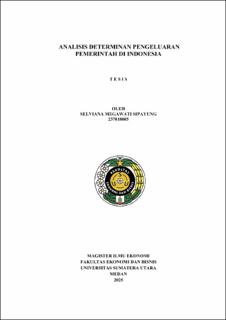Analisis Determinan Pengeluaran Pemerintah di Indonesia
Determinants Analysis of Government Expenditure in Indonesia

Date
2025Author
Sipayung, Selviana Megawati
Advisor(s)
Paidi
Syafii, Muhammad
Metadata
Show full item recordAbstract
Government expenditure plays a strategic role in driving economic growth, improving quality of life, and addressing national development challenges. This study aims to identify the effects of economic growth, the Human Development Index (HDI), the Economic Complexity Index (ECI), imports, national debt, and corruption on government expenditure in Indonesia during the period of 1995–2024. Using the Autoregressive Distributed Lag (ARDL) method, this research evaluates the short-term and long-term relationships among these variables.
The findings indicate that economic growth and national debt have a positive and significant influence on government expenditure both in the short and long term. The ECI has a significant negative impact, suggesting that economic complexity correlates with fiscal efficiency. The HDI has a positive but short-term impact, with no significant effect in the long run. Meanwhile, imports do not show a consistent significant influence. Corruption has a negative effect in the short term but turns positive and significant in the long term.
These results highlight the importance of strengthening economic growth, managing sustainable public debt, improving human capital quality, and implementing governance reforms to enhance the effectiveness of public spending.
Collections
- Master Theses [540]
